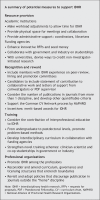A meeting of minds: interdisciplinary research in the health sciences in Canada
- PMID: 17001059
- PMCID: PMC1569944
- DOI: 10.1503/cmaj.060783
A meeting of minds: interdisciplinary research in the health sciences in Canada
Abstract
Brought together by the newly formed Canadian Academy of Health Sciences (CAHS), recognized national leaders in the 6 health sciences disciplines consider the environment for conducting interdisciplinary health research (IDHR) in Canada. Based on first-hand knowledge and thoughtful reflection, the authors argue that although much progress has been made in support of IDHR in Canada, the practical experience of researchers does not always bear this out. This article examines government, industry and academia to identify the cultural and structural characteristics that demand, promote or prevent IDHR in each sector. At its heart is the question, How can universities best support and enhance IDHR, not only for the benefit of science, but also to meet the growing needs of industry and government for intellectual capital? Focusing on the predominant health sciences disciplines, the authors define IDHR as a team of researchers, solidly grounded in their respective disciplines, who come together around an important and challenging health issue, the research question for which is determined by a shared understanding in an interactive and iterative process. In addition, they suggest that IDHR is directly linked to translational research, which is the application of basic science to clinical practice and the generation of scientific questions through clinical observation. This analysis of academic, industry and government sectors is not intended to offer rigorous data on the current state of IDHR in Canada. Rather, the goal is to stimulate research-policy dialogue by suggesting a number of immediate measures that can help promote IDHR in Canada. Recommended measures to support IDHR are aimed at better resourcing and recognition (by universities and granting agencies), along with novel approaches to training, such as government-and industry-based studentships. In addition, we recommend that professional organizations reconsider their policies on publication and governance. Although intended to maintain professional scopes of practice, these policies also serve to entrench disciplinary boundaries in research. We conclude by suggesting a number of research questions for a more rigorous assessment of the climate for IDHR in Canada. We call for an inventory and comparative analysis of academic centres, institutes and consortiums in Canada that strive to facilitate IDHR; an examination of the impact of professional organizations on health research, and on IDHR in particular; and a systematic review of research training opportunities that promote IDHR, with a view to identifying and replicating proven models.
Comment in
-
Advancing interdisciplinary health research: a synergism not to be denied.CMAJ. 2006 Sep 26;175(7):761. doi: 10.1503/cmaj.060961. CMAJ. 2006. PMID: 17001058 Free PMC article. No abstract available.
-
Health science research in Hungary.CMAJ. 2007 Mar 13;176(6):809-12. doi: 10.1503/cmaj.1060222. CMAJ. 2007. PMID: 17353536 Free PMC article. No abstract available.
References
-
- Popper KR. Conjectures and refutations: the growth of scientific knowledge. New York: Routledge and Kegan Paul; 1963. p. 88.
-
- Committee on Facilitating Interdisciplinary Research; National Academy of Sciences, National Academy of Engineering, Institute of Medicine. Facilitating interdisciplinary research. Washington: The National Academies Press; 2004.
-
- Marts SA. Interdisciplinary research is key to understanding sex differences: report from the Society for Women's Health Research meeting on understanding the biology of sex differences. J Womens Health 2002;11:501-9. - PubMed
-
- Stokols D, Harvey R, Gress J, et al. In vivo studies of transdisciplinary scientific collaboration: lessons learned and implications for active living research. Am J Prev Med 2005;28:202-13. - PubMed
-
- Rosenfield PL. The potential of transdisciplinary research for sustaining and extending linkages between the health and social sciences. Soc Sci Med 1992;35:1343-57. - PubMed
Publication types
MeSH terms
LinkOut - more resources
Full Text Sources
Miscellaneous

